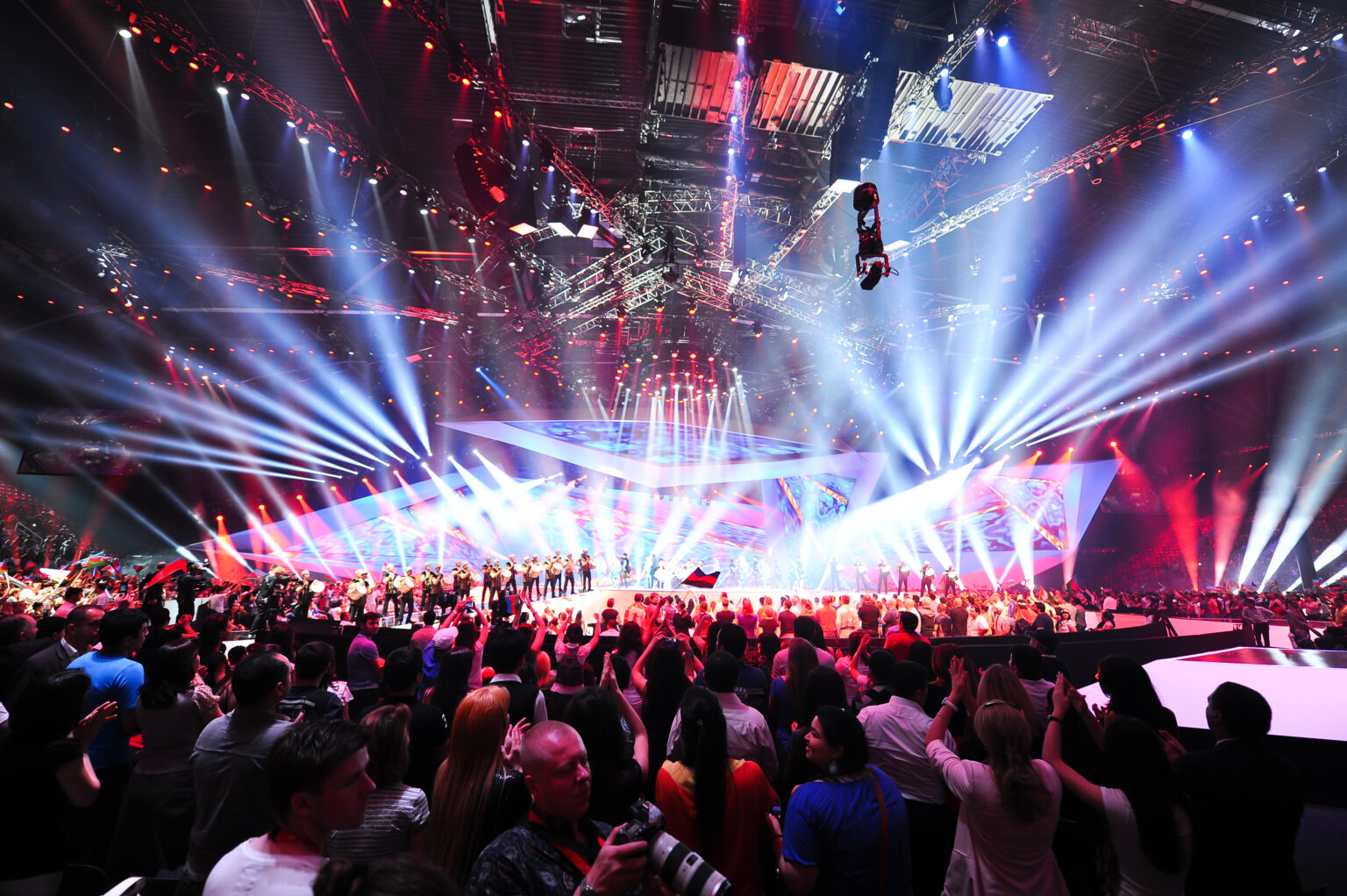Sweden is one of the most successful countries in the Eurovision Song Contest. This makes the competition one of the most interesting events of the year, including Melodifestivalen (a competition that leads to choosing a Swedish representative on ESC). Today, the day before the Grand Finale of the Eurovision Song Contest 2023, I’m going to tell you more about the history of Sweden at the competition.
- Eurovision Song Contest
- Sweden’s Early Years at Eurovision
- ABBA’s Triumph and the Emergence of Swedish Pop Music
- Sweden’s Golden Era: The Rise of Carola and Charlotte Perrelli
- The New Millennium: Sweden Dominates Eurovision
- The Legacy of Sweden at Eurovision: Inspiration and Influence
- What’s Next for Sweden at Eurovision?
Eurovision Song Contest
Eurovision Song Contest is an annual international music competition that originated in Europe in 1956. The contest features participants from various countries who compete against each other by performing an original song live on stage. The event has gained massive popularity over the years and has become a cultural phenomenon not only in Europe but also around the world.
The competition is known for its unique blend of music, fashion, and spectacle, and has launched the careers of many successful artists. The show is watched by millions of viewers from around the world, making it one of the largest and most-watched music competitions on the planet. The Eurovision Song Contest has become an important event for many countries, as it represents a chance to showcase their cultural identity, musical heritage, and talent on a global stage.
Sweden’s Early Years at Eurovision
Sweden made its debut at Eurovision Song Contest in 1958, just two years after the first contest was held. The Swedish entry that year was Alice Babs, who performed the song “Lilla Stjärna” and finished in fourth place. In the following years, Sweden struggled to make an impact at the contest, often finishing in the bottom half of the leaderboard.
However, in 1974, Sweden achieved its first victory at Eurovision Song Contest with the legendary band ABBA and their song “Waterloo”. The song became a global hit and launched ABBA’s career on an international level. The victory marked a turning point for Sweden at Eurovision, as the country started to take the competition more seriously and put more effort into its entries.
In the following years, Sweden continued to produce memorable entries, such as “Eloise” by Arvingarna in 1993, which finished in seventh place, and “Kärleken är” by Jill Johnson in 1998, which finished in tenth place.
ABBA’s Triumph and the Emergence of Swedish Pop Music
ABBA’s victory at Eurovision Song Contest in 1974 not only marked a turning point for Sweden at the competition but also for the music industry in general. The band’s unique sound and style paved the way for a new era of Swedish pop music, which became known for its catchy melodies, upbeat rhythms, and bold fashion choices.
ABBA’s success at Eurovision and beyond inspired a generation of Swedish artists, who went on to make their mark on the international music scene. Some of the most notable names include Roxette, Ace of Base, and Robyn, all of whom have achieved global success with their catchy pop tunes.
Today, Swedish pop music remains a dominant force in the music industry, and the country continues to produce some of the biggest pop stars in the world. The legacy of ABBA and their triumph at the Eurovision Song Contest has had a lasting impact on the Swedish music industry and has helped shape the sound of pop music for decades to come.
Sweden’s Golden Era: The Rise of Carola and Charlotte Perrelli
In the 1990s and early 2000s, Sweden experienced a golden era at Eurovision Song Contest, with several memorable entries and multiple victories. Two of the most iconic Swedish artists during this period were Carola Häggkvist and Charlotte Perrelli, both of whom won the competition for Sweden.
Carola first represented Sweden in 1983 with the song “Främling” and finished in third place. She returned to the competition in 1991 with the song “Fångad av en stormvind” and won the contest, becoming a national hero in the process. Her victory cemented her status as one of Sweden’s most beloved artists, and she went on to represent the country again in 2006 with the song “Invincible”, finishing in fifth place.
Charlotte Perrelli, formerly known as Charlotte Nilsson, also made a significant impact at Eurovision Song Contest during this era. She first represented Sweden in 1999 with the song “Take Me to Your Heaven” and won the contest. She returned in 2008 with the song “Hero”, unfortunately without any success and finishing in eighteenth place.
The success of Carola and Charlotte Perrelli helped establish Sweden as a dominant force at Eurovision Song Contest and set the stage for the country’s continued success at the competition.
The New Millennium: Sweden Dominates Eurovision
In the new millennium, Sweden continued to dominate Eurovision Song Contest, with multiple victories and several memorable entries. In 2012, Sweden achieved its fifth victory at the competition with the song “Euphoria” by Loreen. The song became an international hit and propelled Loreen to stardom.
Since then, Sweden has won the contest again, with “Heroes” by Måns Zelmerlöw in 2015. The country has also achieved top-five finishes almost every year since 2011 (with exceptions in 2013, 2018, and 2021), cementing its status as one of the most successful countries in Eurovision history.
Sweden’s continued success at Eurovision can be attributed to its dedication to producing high-quality entries and its willingness to embrace new trends and styles. The country has consistently pushed the boundaries of what is possible at the competition, setting new standards for performance, staging, and songwriting.
The Legacy of Sweden at Eurovision: Inspiration and Influence
Sweden’s impact on Eurovision Song Contest extends beyond its multiple victories and memorable entries. The country’s unique blend of pop music and performance art has influenced the competition and inspired artists from around the world.
Sweden’s success has also inspired other countries to take the competition more seriously and put more effort into their entries. Many countries have started to adopt the Swedish approach to Eurovision, focusing on producing high-quality songs, staging memorable performances, and even asking for the help of Swedish songwriters in preparing their own entries.
The legacy of Sweden at the Eurovision Song Contest is a testament to the country’s musical heritage and its commitment to innovation and creativity. Sweden has proven that with dedication and hard work, anything is possible at the competition.
What’s Next for Sweden at Eurovision?
Sweden’s legacy at Eurovision Song Contest is secure, but the country is not content to rest on its laurels. Swedish artists and songwriters continue to push the boundaries of what is possible at the competition, exploring new genres and styles while maintaining the country’s signature sound and aesthetic.
The future of Sweden at Eurovision is bright, and fans can expect more memorable entries and electrifying performances in the years to come. As the competition evolves and changes, Sweden will undoubtedly continue to play a leading role, inspiring and influencing artists from around the world and helping to shape the future of Eurovision Song Contest.
We wish Loreen good luck tomorrow at the Grand Finale! And if you want to go for a journey through all the Swedish Eurovision Entries, we’ve prepared a special playlist that makes it possible! Enjoy!
















